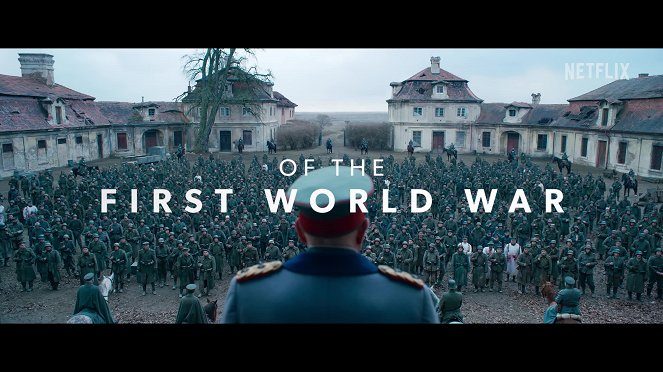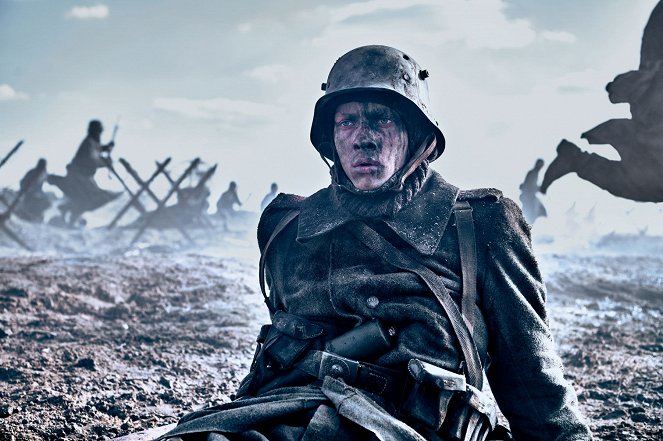Directed by:
Edward BergerCinematography:
James FriendComposer:
Volker BertelmannCast:
Felix Kammerer, Albrecht Schuch, Moritz Klaus, Aaron Hilmer, Adrian Grünewald, Edin Hasanović, Daniel Brühl, Devid Striesow, Sebastian Hülk, Andreas Döhler (more)VOD (1)
Plots(1)
All Quiet on the Western Front tells the gripping story of a young German soldier on the Western Front of World War I. Paul and his comrades experience first-hand how the initial euphoria of war turns into desperation and fear as they fight for their lives, and each other, in the trenches. The film from director Edward Berger is based on the world renowned bestseller of the same name by Erich Maria Remarque. (Netflix)
(more)Videos (4)
Reviews (10)
Erich Maria Remarque is one of my most beloved authors, one I come back to repeatedly throughout my life, and I have long postponed reading the first German adaptation of his most famous novel and the one most required in school curricula. There were many rumors about an inaccurate or even arrogant revision, so I am now shocked by how good the adaptation is. Not necessarily as the adaptation of a work, but rather as the comprehensive work of the filmmaker. It is precisely in the much criticized storyline of the negotiations over the end of the war that a few words or sentences are used to express the eternal pain that also appeared in books taking place long after the conflict or between the world wars. The minds and thoughts of the heroes mostly only harbor complaints about the unnecessary prolongation of the armistice, which results in the deaths of many innocents. For greater effect, such subjectivity is replaced with infuriating images and feelings of injustice. In the front lines, it is not about which scenes from the book were successfully transferred to the film (although the famous unbearable waiting in the trench with the enemy does not go lacking), but about the atmosphere of damnation, despair, and eternal damage that permeates every minute. I'm ultimately giving this the highest rating despite the omission of the storyline that troubled me the most in the book. In it, the main character returns home for a few days while on leave and realizes that the kind of return he imagined will probably never be possible. That people who have not experienced the battles will never understand the trauma and horror that a veteran carries. Within the condensation of the plot and the insistence on the destructive environment of contact with the enemy, I understand such a change and am happy to look past it. Because the literary work was created almost a hundred years before this film, and the warnings are no less relevant.
()
Yesterday, I saw the 1979 American rendition of this movie, and while it had its flaws, the creators stayed true to the book, albeit loosely at times. On the flip side, despite the correct title and character names, the new German version diverged significantly from Remarque's book. Unlike the American version, the German one painted a more realistic picture of the war—the trenches looked right, and it effectively portrayed the impersonal war machinery where soldiers were treated as mere expendables. However, the creators took the de-personalization to an extreme, resulting in flat characters (except for Paul and Katczinsky), making it difficult for me to connect with any of them. Even when they made an effort to make the battles realistic, there were lapses, like extras wandering around destroyed trenches after artillery bombardments. Fortunately, the French machine gunners were apparently on a smoke break. Putting the book aside (which is a challenge for me), it was a decently crafted film depicting the senselessness of warfare, showing the ludicrous pursuit of a two-hundred-meter strip of land, resembling the moon's surface, at the cost of hundreds of thousands of casualties on both sides. / Lesson learned: Running towards machine guns is not a healthy sport.
()
The repetitive alternation of the heat of battle and the coldness of waiting, the recurring motifs for unimaginative half-wits, the book’s premise stripped of all its compelling scenes, which the film replaces with simple (and sometimes unrealistic) war porn and a completely hollow political storyline. The film fails to approximate Remarque’s insistent humanism except by literally illustrating the conflict of minor and major history, which doesn’t make a lot of sense (the horrors of the First World War didn’t actually consist in the fact that Foch wanted an armistice in six days and the Germans needed to think it over). As an adaptation, this is a disaster, devoid of psychology and with no thoroughly developed characters, and as a film it’s drawn out, transparent and superficial. The versions from 1930 and 1979 had something to them, but this fails even as a stand-alone work. Netflix’s problem isn’t the lack of casting actors of color. Its problem is that its projects lack dramaturgy and thus don’t much sense.
()
I haven’t read the novel, so I’m reviewing this strictly as a war movie. In technical terms, it’s fine. There is nothing to criticise when it comes to the sets, costumes, camerawork or the depiction of the battle and negotiation scenes. However, the detailed portrayal of the characters and, mainly, the dialogue come up short, feeling flat and failing to emotionally engage the viewer. The film lacks a strong screenwriting focus on the personal stories of the protagonist and several other characters.
()
I have to start by saying what a pity it is that the film went directly to Netflix and not to cinemas. It was not as immersive an audiovisual experience as 1917 or Dunkirk, but still, many scenes would have been great on the big screen. I was a little hesitant to see the film at first, but I was surprised to learn it was nominated in nine categories for the Academy Awards, so I had to see for myself. Although the film is called All Quiet on the Western Front, it is a rather loose adaptation, which I personally didn't mind; the source material matter may have been viewed from a slightly different perspective, with an emphasis on the contrast between the "insignificant" soldiers in the sodden trenches with no food and the "big" men in the heat with plenty of food, but the basic ideas of the horrors and futility of war, as well as the stolen youth at the expense of "higher" goals, are present. I commend the film's reliance on rather unknown faces in most cases, though in the case of the protagonist I kept thinking about Rupert Grint. Although the film is nearly two and a half hours long, it managed to keep me engaged for the entire running time (the soundtrack, which was at times very dissonant to my ears, was harder to get used to), whether it was the realistically rendered and frightening shots of the front line (the arrival of tanks, flamethrowers and the flooded hole sequence will stay in my head for some time to come), the banter among comrades, or the theft of poultry. But the nine nominations seem excessive, even though the result is (at least technically) a fine film.
()



Ads